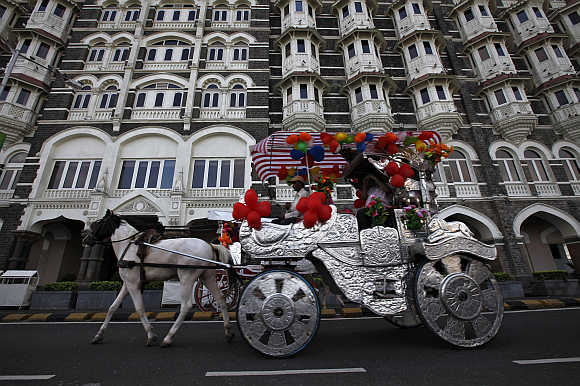 | « Back to article | Print this article |
We let our heart rule the head, says Ruchir Sharma
How many of us travel with $25 billion in our luggage?
Ruchir Sharma, head of the emerging markets equity team at Morgan Stanley Investment Management, New York, certainly does. An economic traveller, he hops from country to country, uncompromisingly sniffing out opportunity, for Morgan Stanley's billions. Every week he may be in a different country, figuring out its economic climate, testing its investment waters.
Like a detective, he has to quickly and astutely construct a picture of the financial scene of a nation, based on any clue he picks u - a stray remark by a taxi driver, the prices in his hotel, a careless comment by a politician and more. And make an informed investment decision on the country.
Last year, Sharma, a native of Jaipur, a graduate of Delhi's Shri Ram College of Commerce, decided to write a book about his travels. Breakout Nations: In Pursuit of the Next Economic Miracles was a bestseller.
A few weeks ago, Sharma, the author and investment banker, was in India to attend the Jaipur literature festival. He was in conversation with Nandan Nilekani, chairman of the Unique Identification Authority of India, about his book.
India Abroad's Vaihayasi Pande Daniel listened in. This is the second of a three-part feature. For the first part, click here.
Nandan Nilekani: So that means your travel is often against the tide. If a place is a great place to go for a holiday, then you surely won't invest there. And if the place is terrible for a holiday, this is the place to invest. Do you have some principle for that?
Ruchir Sharma: The big risk these days - the occupational hazard - is that we let our heart rule the head. So if you go to South Africa, you instantly fall in love with it - the wildlife, Cape Town etc. But you have to control yourself. It is one country I would like to spend an extra weekend in. But I have to be very careful, because even though it is a beautiful place to visit, I think it is one of the riskiest places to invest in today.
Social tensions are really rising in South Africa. Unemployment rates are 25 per cent, and for blacks 50 per cent or something. It is a real tinder box. They don't know how to solve this problem.
Nilekani: So your tourist dollars should not follow your investment dollars?
Sharma: Absolutely.
Nilekani: One of the points you make in your book is that 2003 onwards there was this huge boom. China was growing. There was a commodity boom. Interest rates were low. There was a rising tide where countries were growing rapidly. (Each respective country) often thought it was doing a great job and that's why it was growing rapidly. But in reality they are growing because of these macro conditions.
Do you feel this is what made a lot of people become complacent?
Sharma: One question, which in India also we have not answered, which is so for most emerging markets - what happened in 2003? I think, until 2002, India's growth rate was ambling along at a decent pace of about five-and-a-half or six per cent or so.
Then something magical happened in 2003 when India's growth rate exploded to about eight-and-a-half, nine per cent and it remained that way till the end of the decade. The question that people don't answer is: What happened in 2003?
To me (it was a) combination of the facts. There was a lot of easy money in the world. You had emerging markets which were sort of rising in unison. Between 2003 and 2007 every single emerging market in the world, from Brazil to Russia to Turkey to Indonesia, was doing well. The whole world was doing well.
The peak here in India was 2007. There about 180 economies in the world tracked by the IMF. In any typical year about 20 to 30 per cent of the economies report a negative GDP growth rate. Of the 180 economies in 2007 only three economies reported a negative growth rate. Only three.
In 2007, the boom was so (staggering) that only three countries reported a growth rate which was negative. Which were those three countries? Fiji, Zimbabwe, Congo. So my point was: Who cares? (Sharma means it was not significant that India was doing well because most countries were doing well at that time.)
Click NEXT to read more...
We let our heart rule the head, says Ruchir Sharma
Nilekani: What was the global confluence of events which led to this rising tide?
Sharma: The US began its zero interest rate policy back then, which led to a lot of global liquidity. Also, emerging markets had gone through their series of crises in 1997-1998 - Russia etc; they had cleaned up their balance sheets - they were positioned to grow well after that.
So a combination of clean balance sheets, also the fact that you had very easy liquidity, with zero interest rates coming from the US, that rising tide of global liquidity and a very strong US consumer led to this synchronous boom across all emerging markets.
Nilekani: So you are saying a lot of people thought they had done something different, but actually the whole world was rising?
Sharma: Yes, because India's growth rate went from five-and-a-half to eight-and-a-half, nine per cent. The growth rate of all emerging markets on an average went from three-and-a-half to seven per cent. It was too much of a coincidence to say this was all about India. This was really a rising tide (all over).
Nilekani: What is your reading of what happened in India in the last ten years as a big emerging market? Your company Morgan Stanley was one of the first global investors to discover India way back in 1992 after the first liberalization. So when you saw India in this context of emerging markets, what did you see?
Sharma: Not just India, many countries began to lose the plot. Many countries began to spend away their windfall and stopped reforming. I think most countries grow well because they tend to systematically reform.
In India's case what happened was they stopped reforming. Between 2003 and 2010 you hardly mentioned any meaningful progressive reforms. All the policy decisions were about just redistributing wealth. Not creating new wealth, just redistributing wealth.
I think that is what happened between 2003 and 2010. We mistook the boom for being local, rather than global, and spent that money we got in a lot of giveaways, rather than creating wealth. There were other sorts of fault lines that were developing. One big problem was this commodities boom.
As we got this big boom in commodity prices, a lot of crony capitalism arose because it. A lot of people made money by just digging dirt from the ground. Not from genuine entrepreneurial talent, of the kind you (Nilekani, who co-founded the Indian IT major Infosys) and other companies, created in the 1990s.
Click NEXT to read more...
We let our heart rule the head, says Ruchir Sharma
Nilekani: One of the points you make in your book is that something similar happened in Brazil. About 20, 25 years back Brazil was the hot country, in some senses. People were predicting huge uninterrupted growth. Then something happened and it petered off for 20 years.
So what is the lesson from the Brazilian experience?
Sharma: I think the big lesson here is of the 180 economies in the world today, only 35 are developed. Everyone else is an emerging market. Brazil is that archetypal emerging market which tends to do well for one decade, then they will do make some policy mistakes. And for the next decade or two they regress and are not able to catch up with the West.
For the last 100 years that has been the history of Brazil. It has been the big problem as far as Brazil is concerned. They have one good decade. Then they relax, go to the beach and everything is fine. Then you end up having a lot of problems in terms of what goes on. There is too much welfare spending in Brazil.
That's one of the mistakes we (India) could end up making because we mistake this boom to be something which is self-sustaining, rather than the fact that we need to do work on our own.
Nilekani: So going back to your point. One of the things you talk about is the commodity boom. Was that linked to the growth of China because China was consuming a huge amount of materials for building China?
Sharma: I think it was fuelled by the demand from China. And also the fact that supply was in short supply.
Iif you look at supply commodities, in the 1980s, 1990s, commodity prices were continuously declining. In fact in that period very little new investment came up for commodities. The rise of China took place and very little supply to meet that rising demand from China. So that was a deadly combination.
But this has been the two hundred year history of commodity prices which is: One decade up, two decades down. Commodities are not something that requires genuine entrepreneurial talent or genuine intellectual talent. It is just something you get lucky with. A decade ago, one third of all the billionaires in the world were from sectors such as technology, telecom, TNT sectors, pharma.
By 2010 one third of the billionaires in the world were from sectors such as energy, materials, basically making a lot of money from digging dirt from the ground. Not from entrepreneurial talent.
Click NEXT to read more...
We let our heart rule the head, says Ruchir Sharma
Nilekani: So is the billionaire list one of your metrics? Do you go to a country and say 'Give me your billionaires list. All the billionaires making money on iron ore or coal.' Then you say: 'Hey, this country has an issue.' Is that one of your rules?
Sharma: (Laughs). Yes, one of the Rules of the Road. Something I mentioned in the book is called a Billionaire's Index. We look at the number of billionaires in each country and if we think the billionaires control too much of the wealth of that country we think that is a negative sign.
If too much of the wealth being created is coming from sectors such as commodities, rather than genuine enterprise, it is a negative sign. And the third factor, if you look at the billionaire's list, is that you need some churn, new names to keep coming up. If you don't have new names coming up that's a problem.
In India's case all these three factors were flashing red by 2010. If you look at India's billionaires their wealth and their share of GDP was well over ten percent. Ten percent of the GDP is the cut-off line.
Very few countries in the world do billionaires have more then ten percent of the country's wealth. And those are Russia, Mexico, and Malaysia. All countries where you know things are not that hunky dory.
Nilekani: Do they give you a visa again for all these countries you talk about?
Sharma: I have been told not to go back to Russia for a while, so I am staying away.
Nilekani: They have room for you in Siberia maybe?
Sharma: Or you go to some country and find that drugs have been slipped into your bags or something... (laughs). But I found that India was flashing red on that signal. The second signal was that if you look at India's billionaire wealth, very few new billionaires came up in India in the last five years, in general.
A lot of billionaires in the top ten were the old billionaires. There will always be old billionaires. But you need new companies to come up. You need a new sort of Apples, Googles to come up from nowhere.
That tells you that the laws of creative destruction are working very well in this country. So India was flashing red.
Click NEXT to read more...
We let our heart rule the head, says Ruchir Sharma
And three, a lot of billionaires coming up, were coming up from sectors such as commodities and those sectors that are not that productive. So India was flashing red on all those three things. The good news is that we will be getting some correction of this.
One feel-good factor is that in the top ten billionaire list, after a long time we have a new billionaire, who is not from a commodity sector. This is Dilip Shanghvi from Sun Pharma (the fifth largest drug maker in India). You need more of these instances to come up, where the wealth is not being created because of government connections or real estate or commodities.
Nilekani: One more by-product of what you described is with this rise of crony capitalism, the sense that people are making their money by getting gold cheap or iron ore cheap or whatever. Has it also, in some sense, in India, diminished the support for a market economy? That people are saying it may be better to go back to the good old days because this not what we wanted?
Sharma: This is was what happened in Latin America too. You need for reforms to be supportive. You need other people to be included in the process. When they see that wealth is being created by unfair means, that leads to a backlash against reforms. This is, in fact, what I have against the current (Indian) government too.
When the first signs of this were emerging in 2010 I remember doing this Newsweek cover story back then and the response was that this is the price we have to pay for our growth, that some side effects will take place. But no! You have to correct the side effects. You have to do it preemptively rather than wait for a backlash to build up and then you have negative fallouts because of that.
Part I: Travelling with $25 billion in luggage!
Part II: 'Energy revolution is America's big comeback story'




